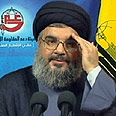
Prime Minister Ehud Olmert received an unusual vote of confidence on Tuesday evening from Hizbullah Secretary-General Hassan Nasrallah as the latter reveled in Olmert's comments from earlier this week in which he said the idea of Greater Israel was no longer relevant.
"The Lebanese resistance pounded the last nail in the coffin of 'Greater Israel' after the defeat it (Israel) suffered in 2000," Nasrallah declared proudly in a speech delivered after the breaking of the Ramadan fast.
"The victories of 2000 and 2006 destroyed the dream of a vast Israeli power. The mighty Israel fell in the last war, and it has now become as the Arabs once were – making speeches and threats. Today we face 'Mediocre Israel.'"
In what was likely his last cabinet meeting as prime minister, Olmert said "the notion of Greater Israel no longer exists, and anyone who still believes in it is deluding themselves.
Olmert spoke soon after the cabinet's debate on the controversial evacuation-compensation bill ended. "Forty years after the Six Day War ended, we keep finding excuses not to act. This isn't doing Israel any good. The international community in starting to view Israel as a future binational state," Olmert said.
'Natural Palestine'
Nasrallah shared his geopolitical beliefs with his audience, saying there were three different models of the State of Israel.
"The first Israel is the vast one stretching from the Nile and to the Euphrates. The second is the strong Israel, which does not include Lebanon and Jordan but settles for historic Palestine, but it is a strong country that forces its decisions on the region. And there is 'regular Palestine,' the borders of which are
unknown.
"The Palestinians sought autonomy in Gaza and the West Bank, however the events that transpired after the Intifada and opposition in Israel forced it to withdraw from Gaza. This is a withdrawal from the borders of 'natural Palestine."
Nasrallah also addressed the assassination of Hizbullah operations officer, Imad Mugniyah. "Those who wanted to kill Imad Mugniyah – should worry," he said. He also stressed that "the resistance in Lebanon has gone past the stage where it relies on a political or military leader, and it has the ability to create leaders on all levels."















